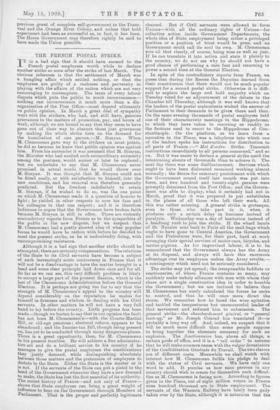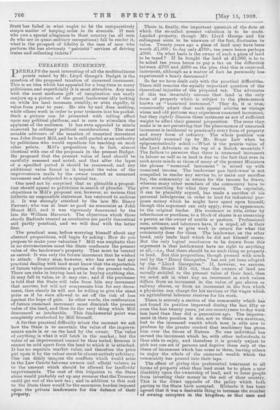THE FRENCH. POSTAL STRIKE.
IT is a bad sign that it should have seemed to the French postal employees worth while to declare another strike so soon after the strike of last March. The obvious inference is that the settlement of March was a bungling affair which settled nothing, or that the employees are guilty of a rashness and perversity in playing with the affairs of the nation which are not very encouraging to contemplate. The issue of every labour dispute which puts the public to much inconvenience— nothing can inconvenience it much more than a dis- organisation of the Post Office—must depend ultimately on public opinion. In March a great deal of sympathy went with the strikers, who had, and still have, genuine grievances in the matters of promotion, pay, and hours of work, although we are bound to say that they seem to have gone out of their way to obscure those just grievances by making the whole strike turn on. the demand for the humiliation of one person,—M. Simyau. When M. Clemenceau gave way to the strikers on most points, he did so because he knew that public opinion was against him. From his surrender it was assumed that M. Simyan, the Minister who had excited such extraordinary animosity among the postmen, would sooner or later be replaced ; but we undertake to say that M. Clemenceau never promised in actual words that he would throw over M. Simyan. It was thought that M. Simyan could not be fitted easily, or with satisfaction to himself, into the new conditions, and his removal was therefore generally predicted. But the freedom indefinitely to retain M. Simyan, if he wished to do so, was the one point on which M. Clemenceau made it a question of honour to fight ; he yielded in other respects to save his face and his colleague in that one respect ; and it is therefore ludicrous to argue that the Government have broken faith because M. Simyan is still in office. There are violently contradictory reports from France as to the sympathies of the public in the new dispute, but we suspect . that M. Clemenceau had a pretty shrewd idea of what popular forces be would have to reckon with before he decided to meet the present strike, as he is undoubtedly doing, with uncompromising resistance.
Although it is a bad sign that another strike should be attempted, there are certainly compensations. The relations of the State to its Civil servants have become a subject of such increasingly acute controversy in France that it will not be a disadvantage to have the matter brought to a head and some clear principle laid down once and for all. So far as we can see, this very difficult problem is likely to occupy a large part of the present Session, which is the last of the Clemenceau Administration before the General Election. It is perhaps not going too far to say that the strength of M. Clemenceau's appeal to the country will depend considerably on the reputation he makes for himself in firmness and wisdom in dealing with his Civil servants. In other matters he will not have a very full hand to lay before the country. Little progress has been made—though we hasten to say that in our opinion the fault has not been M. Clemenceau's—with the Courts-Martial Bill, or old-age pensions ; electoral reform appears to be. abandoned; and the Income-tax Bill, though being pressed on, has yet to be conducted through many dangerous places. There is a great opportunity, then, for M. Clemenceau in his present troubles. He will achieve a fine administra- tive act and do a brilliant service to his country if he manages to give the postal employees the ameliorations they justly demand, while distinguishing absolutely between those matters and the pretension of employees to dictate to the State. Either the State is the master or it is not. If the servants of the State can put a pistol to the head of the Government whenever they have a new demand to make, the State has lost the first essential of its authority. The recent history of France—and not only of France— shows that State employees can bring a great weight of influence to bear on the Government through Members of Parliament. That is the proper and perfectly legitimate channel. But if Civil servants were allowed to form Unions—with all the ordinary rights of Unions—for collective action inside Government Departments, the whole idea of State employment being either a privileged position or a position of trust would be gone, and no Government could call its soul its own. M. Clemenceau sees all that clearly, of course, being wise as well as just. If he can translate it into action and state it plainly to the country, we do not see why he should not have a good chance of performing a rare feat and returning to power a second time at the General Election.
In spite of the contradictory reports from France, we guess that during the Recess the Deputies learned from their constituents that there would not be much popular' support for a second postal strike. Otherwise it is diffi- cult to explain the large and bold majority which on ' Tuesday voted for an adjournment of the debate in the Chamber till Thursday, although it was well known that the leaders of the postal malcontents wished the answer of Parliament to their demands to be given. there and then. On the same evening thousands of postal employees held one of their characteristic meetings in the Hippodrome, to which they have taken to resorting as readily as the factions used to resort to the Hippodrome of Con- stantinople. • On the platform, as we learn from a narrative in the Times, was a telephone into which one of the leaders spoke his instructions for distribution to all parts of France :—" Met d'ordre. Strike. Transmit iustructions immediately to all persons concerned;" and so on. But it was easier to declare a general strike amid the intoxicating shouts of thousands than to achieve it. The next day there was some disillusionment. Services which ought to have been dislocated remained working almost normally ; the decree for summary punishment with which the Government armed itself last month was put into force, and two hundred and twenty-eight persons were promptly dismissed from the Post Office; and the Govern- ment was able to display, what it certainly had not in March, proof that it was prepared to pat , substitutes in the places of . all those who left their work. All this was rather sobering. A general strike is grotesque, even to those who take part in it, when it produces only a certain delay in business instead of paralysis. Wednesday was a day of hesitation instead of a headlong rush to join the strike. If the wharf hands of St. Nazaire sent back to Paris all the mail-bags which ought to have gone to Central America, the Government and. the Prefectures were, for their part, hard at work arranging their special services of motor-cars, bicycles, and carrier-pigeons. As for improvised labour, it is to be remembered that the Government always has the Army at its disposal, and always will .have this enormous advantage over its employees unless the. Army revolts,— • a contingency which need not be seriously considered.
The strike may yet spread; the irresponsible faddists or reactionaries, of whom France contains so many, may suddenly make unholy alliances with men with.whom they share not a single constructive idea in order to humble the Government ; but we are inclined to believe . that M. Clemenceau has nicely calculated the forces he seeks to control, and that he will once more . direct the storm. We remember how he faced the wine agitation and tackled the tempestuous but unresourceful leader of that movement and reduced him to submission. The general strike—the chambardement general, or " general bust-up," as Mr. Joseph Conrad has translated it—is probably a long way off. And, indeed, we suspect that it will be much more difficult than some people suppose to bring together the elements necessary for such an explosion.. The fonctionnaire has, above all things, a • certain pride of office, and it is a " tall order " to assume • that he will make common cause with the vulgar devastators of the Confed4ration Gen6rale du Travail. The two classes are of different caste. Meanwhile we shall watch with interest how M. Clemenceau fulfils his pledge to deal with the status of Civil servants. We have only one word to add. It puzzles us how sane parsons in any country should wish to create for themselves such difficul- ties as M. Clemenceau is facing now. According to figures given in the Times, out of eight million voters in France nine hundred thousand are in State employment. The servants of the Western Railway have lately been gaily taken over by the State, although it is notorious that the State has failed in what ought to be the eomparatively simple matter of keeping order in its arsenals. If men who owe a special allegiance to their country (as all men do who are in quasi-military occupations) fail to render it what is the prospect of fidelity in the case of men who perform the leas obviously " patriotic" services of driving trains and collecting tickets ?











































 Previous page
Previous page